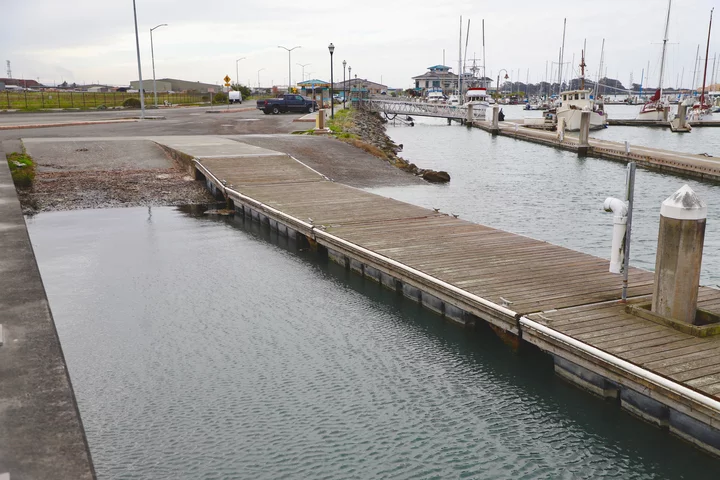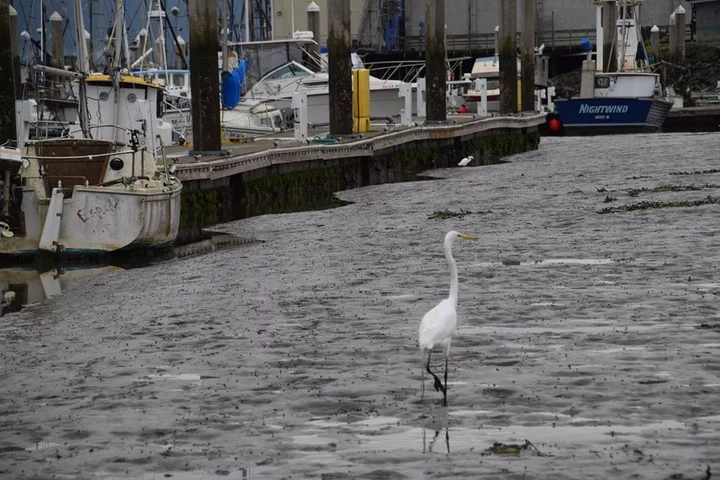Eureka’s public boat launch facilities need a good dredging. The boat ramp has become inundated with silt in recent years, leaving one lane nearly impassable. | Photo: Andrew Goff
###
The local fishing community is sounding the alarm over ongoing maintenance and safety issues at the Eureka Public Marina and boat launch facilities, near the Wharfinger Building on Waterfront Drive.
Over the years, the two-lane boat ramp has become inundated with mud, leaving one lane nearly inaccessible, according to Kent Hulbert, vice chair of the Humboldt Harbor Safety Committee and director of the Humboldt Area Saltwater Anglers (HASA).
“There’s two boat launch lanes but only one is useable on a regular basis because [the other one] gets silted in and collects seaweed,” Hulbert told the Outpost. “It’s not dredged very often and the mud is so thick you can’t launch a large boat without worrying about touching the bottom, especially on a low tide. A lot of the time people don’t want to back their vehicle down into the mud [because] they don’t want to get their boat stuck down there.”
Many of our readers will remember what happened several years ago, when the marina became so inundated with mud and gunk that docked boats would run aground every low tide, rendering them useless for hours at a time. The government agencies tasked with dredging responsibilities bickered over how to dispose of the sludgy stuff for years before eventually agreeing in 2017 to tow it out to the Humboldt Open Ocean Dredging Site (HOODS), a square-shaped patch of sea located approximately three miles offshore. Eureka’s Public Marina hasn’t been dredged since.
The Eureka Public Marina pictured in 2016. Photo: Bob Oglesby
The city had plans to join the Humboldt Bay Harbor, Recreation and Conservation District’s dredging operation earlier this year, but those plans fell through when a staffer with the Environmental Protection Agency (EPA) informed Eureka City Manager Miles Slattery that the city was required to do additional testing.
“There’s a new employee at the EPA that has a different viewpoint about the sampling that needs to be done in order to dredge,” Slattery told the Outpost. “During previous dredge cycles, we’ve always done chemistries where we take sediment samples and test for dioxin, metals, PCBs and other constituents. Once that’s cleared, you can go dredge. We did that, but this employee at the EPA feels as though we need to do toxicity tests.”
In years and decades past, the city has sourced geological data from the U.S. Army Corps of Engineers, the agency responsible for maintaining federal navigation channels in Humboldt Bay, but it seems the EPA has modified its testing standards.
[CLARIFICATION: In 2022, the State Water Resources Control Board adopted new Aquatic Toxicity Provisions to bolster protections for aquatic life in enclosed bays and estuaries. The provisions were approved by the EPA in 2023. The testing requirement is a statewide requirement to protect water quality and aquatic organisms.]
“The previous EPA employee didn’t require toxicity tests because we used data that was gathered by the U.S. Army Corps of Engineers, which is in close proximity [to the marina],” Slattery said. “There hasn’t been any new industry within the bay or any spills that would cause any toxicity issues. However, this EPA employee decided to have us do the test, which made us miss the window to utilize the same bid process that the Harbor District did. Our plan is to go out and dredge next year.”
“Our boat launch is just fine,” he added. “It’s still usable, it’s just a matter of timing the tide.”
However, that’s not the only issue at the marina. Pamyln Hentz Millsap, an avid fisher and retired Eureka Police Department homeless liaison, has seen an uptick in abandoned vehicles parked in the marina parking lot and along Waterfront Drive.
“The parking lot is a nightmare because there aren’t many parking spaces. People towing boat trailers often don’t even have a place to park because abandoned vehicles are parked there,” Millsap told the Outpost. “A lot of the vehicles can’t be moved because they’re broken down and people are living in them. It looks like a dump.”
The public bathrooms are also a problem. The bathrooms are often locked, and when they are open they’re “nasty,” Millsap said. On two occasions she’s encountered people “shooting up” and sleeping on the bathroom floor.
“Homeless people don’t scare me because I’ve worked with them so long but I’ve heard other people complain,” she said, noting that she helped form the county’s Mobile Intervention Services Team (MIST), which serves homeless people experiencing mental health crises. “I’m not trying to be mean, you know? I worked with the homeless community for years when I was at EPD. That population has a big piece of my heart.”
Asked what EPD and the city could do to alleviate the issue, Millsap thought for a moment before saying, “You know, I don’t know.”
“I’ve contacted [EPD’s Community Safety Engagement Team] CSET and said, ‘Hey, can you guys do something about this?’ but their hands are often tied due to different laws,” she continued. “I just think this [portion of the waterfront] is a forgotten area. … It seems to be a really handy spot where people can park their vehicles and stay out of sight of downtown business owners. … Everybody is trying to do what they can, but it’s not a good situation.”
Millsap and Hulbert both felt the city should do more to maintain and, ideally, update the public facilities at the marina. While commercial fishing has declined over the years, it’s still a significant part of Eureka’s identity and a big draw for people visiting the region, Hulbert said.
“I just don’t think the city has prioritized it,” he continued. “You know, people come a long way to go tuna fishing or crabbing up here. Those people are spending money here. They’re staying in our hotels and paying into the transient occupancy tax (TOT). And I don’t think they’re getting their money’s worth because our facilities aren’t up to par. … It’s kind of embarrassing that Crescent City had a much better facility than we do.”
A new fish-cleaning station would make a huge difference. There’s an existing fish-cleaning station down on the dock, but it’s “not really useable,” Hulbert said.
The problem: High-quality fish-cleaning stations are really expensive. If the city were to purchase a new fish-cleaning station, Slattery said it would have to be equipped with an industrial grinder to break down the fish carcasses.
“It’s so cost-prohibitive to deal with the carcasses,” he said. “If Pacific Choice were still processing shrimp, that would have been a viable option for those carcasses because they could have gone into their shrimp waste, which is sold for other products. But, unfortunately, they stopped processing shrimp.”
The city is partnering with a few local fishermen to start a waterfront fish market, though it’s still in the early stages. “If that happens, there would be a fish-cleaning station there,” Slattery said.
If it’s an issue of funding, Millsap said the city could impose a parking fee at the marina.
“Crescent City, Brookings, Charleston, and many of the other places charge people to park in certain areas,” she said. “I think it’s maybe $5 or $6 a day in Crescent City. I know that might aggravate people but I think that money could be used for upkeep on the bathrooms and the dock, which are often in disarray. I don’t think any of us would object to paying a daily, or even a yearly payment to park there if [the facilities] were decent and the upkeep was decent.”
Slattery said that’s something the city would be willing to look into as part of the “bigger picture” for the waterfront, but said it wouldn’t generate enough revenue to cover the cost of big projects like dredging.
###
[NOTE: A previous version of this story incorrectly identified Millsap as a retired EPD police officer. We also incorrectly stated that she helped form CSET. The Outpost regrets the error.s]


CLICK TO MANAGE